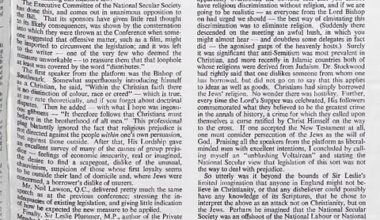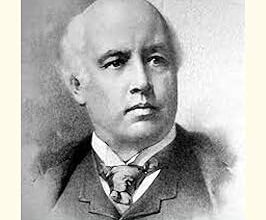
Introduction
Stephen ‘Rationality Rules’ Woodford is the second-largest atheist YouTuber in the UK. With almost 400,000 subscribers to his channel Rationality Rules and various sub-channels, his reach across social media is immense. He has debated many religious friends and opponents, spoken at several sceptic conferences, and even has his own card game, Debunked, based on his distinctive presentation of logical fallacies.
Some of his noteworthy videos include a debate on the problem of suffering with Dr Sharon Dirckx, a response to Dr Paul Copan on Old Testament ethics, and a debate with Justin Brierley on whether Christianity is rational.
Stephen and I have met several times over the past two years, usually when I have invited him to take part in debates in high schools for the radio. After coordinating a live school event for the show Unbelievable (the Dirckx debate, as it happens) we spoke over Zoom about his journey to Rationality Rules. Below you can read a transcript, lightly edited for clarity and concision, of our conversation.
Interview
Samuel McKee: How influential has Christopher Hitchens been in your journey to becoming Rationality Rules?
Stephen Woodford: Hitch was very flawed, but his intellectual virtues were very unique. The way that he called nonsense nonsense was very emancipating. Lots of things under religious frameworks have struck me as absurd, and yet when you find yourself surrounded by people who want to treat it with reverence and you want to ask the hard questions without being pushed aside, hearing a voice like Hitchens’s that would call it what it was, that was amazing. And of course, he was so good in debate with his flair and rhetoric. He was very inspiring. So of course, he was my main inspiration getting into this and he remains close to my heart.
You started your activism in your late teens, so the ‘Four Horsemen of New Atheism’ were all still kicking at that time. Would you say your core values are the same as theirs? Such as reason, Enlightenment values, rational thinking, and science leading the way? These all seem central to your message.
My core values can be hard to gauge as I speak on so many different topics. Speaking against religion, they [the New Atheists] weren’t really displaying those values you mention—rather, they were trying to get across that we should be able to criticise religion and not have to treat it with reverence. In terms of those values you mention and the emphasis on humanism and questioning, they are something I very much align with. But as for other values they [the New Atheists] might have held, probably not always. A lot of people who are secular and humanist will have similar kinds of values when it comes to societal issues but there is no guarantee. There can be a lot of variance among different figures, with some being more left-wing than others, so it is really difficult as your values will drive what you think of politics, not just religion.
What has driven your increased engagement with politics?
When someone’s religious beliefs don’t affect how they treat other people, in my book they are frankly none of my business. If they want an intellectual exchange, then great. Religion becomes a problem when they start trying to dictate the lives of other people based on their religious views, especially when it’s in such a way that is not justified in their religion (which I think is false anyway). So when it comes to social issues, the reason I speak out against religion is because I see it as a force for evil in the world.
Do you see your mission as a continuation of the mainstream atheism of the 19th-20th centuries and then New Atheism? That is, continuing the tradition of Enlightenment values in the same vein?
Yes, I do. We don’t have the same views across the board of course, but the core values of non-belief, wanting to live life to the fullest potential without religion dictating who I sleep with and how, etcetera—yes, it is a continuation. It is basically my mission (the way that I see it) to provide young people in general with more information and more diverse thought so that they can process that and do what they want with it. I want people to have more access to opposing views so that they can better think out their own worldview.
And YouTube is an ideal means of doing that. Going back to Hitchens, he will live forever through YouTube. Is that why it is your main platform?
That has never been a thought in my mind, but you are right. Hitchens said that people talk about wanting to go to heaven to see their heroes, but you can see them now by picking up their books and reading their words. They are with you. Now I can see Hitch whenever I want. There is an element of being permanent because of the YouTube platform, but it is largely because it was the platform on which I could express my views through video that I chose it.

Are you finding your videos watched all over the world? And have you had videos banned in certain countries?
Unless they are using VPNs, you can get a good idea of the demographics of your audience. My audience is predominantly based in the USA, the UK, and then Germany and across Europe. India has been increasing significantly. And now, I am also seeing a lot of viewers in Muslim-majority countries, though this data is skewed because a lot of those viewing my content are using VPNs so that they can watch me without it being on their track record.
Whenever I go into conspiratorial content, especially to debunk it, I am at the biggest risk of being banned. This is strange—I can be speaking about Hell (an infinite punishment for a finite crime) and YouTube can be like ‘Yeah, that’s fine.’ Then I make a video about why 5G towers don’t cause COVID and YouTube will flag it and it gets deleted, so it kind of depends on the topic.
One thing I can do, and this is partly due to the legacy of Richard Dawkins and the Four Horsemen, is criticise Christianity quite harshly—and fair play to Christians as well, they can just ignore me—whereas you can’t do the same to Islam; there is a sensitivity there where you are more likely to get banned. You can say exactly what is factually the case, but if it has a tone which is demeaning then that might constitute a reason for YouTube to say, ‘That counts as hate speech.’
Let’s discuss tone, because when I think about yourself and Hitch, rhetoric sticks out to me as the main parallel between you. Your style is polemical in a very similar way in that you want to make sure that tough questions get asked and that people don’t have a chance to get away with an unacceptable answer. Young people have said of yourself and Alex O’Connor that you ask the questions that they wish they could ask. Is that just your style or is it something you were intentional about from the beginning?
It’s learned. I’ve been doing this for a long time now and I have realized something that is sadly true: it is less what you say and more the way that you say it. There is a lot of consideration that goes into discourse. An analogy used by the content creator Destiny is that you can either have long legs or long arms. If you want long legs—that is, more conversations—then you have to tolerate fluff and nonsense because what you are doing is showing them and others that ‘I can have a nice conversation with you.’
But I think that is not effective and a waste of people’s time. I think that can be very dangerous because it gives credence to those views, and I don’t want to do that. So, if someone gives a bad answer, I go for the long arm approach, which is, ‘I am going to hold your feet to the fire, because although in your circles you can get away with saying this and everyone will nod along, it isn’t working here.’
If you want to understand why Christianity is plummeting (especially among younger generations) then you have to get out of echo chambers; you need someone with long arms that is going to hit you so that you can hit back and really start thinking about these issues and taking them damn seriously. So, my view has been to swing hard and to make sure that I hold people’s feet to the fire. Time is precious and I don’t want to waste people’s time.
There is an element here about rhetoric and the way you want to say things. I want to make things succinct where things are clear. Does that count as rhetoric? Maybe I can be accused of that. But it is an effective way to communicate the point. If someone doesn’t have an answer to the problem of evil, for example, just be succinct and tell them so.
When I have taken you and Alex into schools for debates, everyone knows who you are. What is your first guess as to why you have connected so much with Generation Z?
My first guess is that a lot of great academics are not good communicators. In the YouTube space, you need to be able to deliver your point effectively. Alex and I can take something that an academic says and express it in a way that resonates a little bit more in laypeople’s terms. The more you ingrain yourself in academia, the more you build up that language and tone, and it is very flat and boring and it can be verbose. That’s just not going to resonate with most laypeople, or the young either. What you want to do is be able to take the brilliance that academics have and put it through a funnel where you can get that out to a general audience. That is largely what I think Alex and I are doing.
Do you consider yourself an ‘atheist apologist’?
Good question. Not really. There have been plenty of situations in live conversations where I have been corrected and admitted my ignorance, and that is not something you see in a lot of debates. Those acts of humility are not something the audience is there for, and they are not expected of you, whereas the apologist’s job, by my light, is to defend the faith. When I have conversations, I don’t see my job as defending atheism. If atheism is wrong, then fine. My job is to point out where there are flaws [in religious peoples’ views] and where their rhetoric is doing too much work. Often it is just a job of bringing back the dialectic, it’s really not any more complicated than that. But I do not get on stage and think, ‘I’m defending atheism.’ So, no, I am not an atheist apologist.
Even the theists who are super-intelligent in their field tend to overstate their case in fields where they don’t have expertise. That makes them fair game.
You haven’t been afraid to go for well-known philosophers such as William Lane Craig. Is this about making counter-arguments accessible to those who haven’t been to university?
William Lane Craig is a fantastic philosopher, and I do appreciate his work, even though I disagree with almost everything he says. But when it comes to his metaphysics, I tend to bring on professionals like Joe Schmidt and others and get them to bolster the point. Often with theists, they have expertise in one area but speak very confidently in areas where they do not belong. I argue that this is what Craig does. He makes statements that pretty much everyone in the field says are not the case, so bringing experts on is enough to debunk him. Another example is Frank Turek: his PhD is in Christian apologetics and yet he speaks so confidently on things he does not know about. Even the theists who are super-intelligent in their field tend to overstate their case in fields where they don’t have expertise. That makes them fair game.
Can I press you on that? You and Alex are both very young and have undergraduate degrees. You don’t seem to have an interest in doing master’s degrees or PhDs or being academics. And neither of you have a science background. I’m not saying that to offend. I just mean that young people are going to you and Alex for answers rather than going to, say, a Cambridge professor. When you don’t have expert guests, why should people, especially young people, turn to you over academic expertise?
Great question. Receipts! I always back up my statements with receipts. If I make a statement about mathematics, I will include links in the description so that people can look up the experts and their works. That is how you fill those voids. ‘Here are my receipts: check them out for yourself.’ If someone points out a mistake I will pin it in the comments. It’s to do with reputation and response and respecting the academic process and establishment in general. Those things are noticeable, especially to the younger generations who can see when someone is operating in good faith and when they are providing evidence to support their claims. It is really about the receipts.
When did you know that this was what you wanted to do?
From a young age, I wanted to figure out the world. My mother was an alcoholic, and she was physically and emotionally abusive. My father was absent and worked on an oil rig. When he was around, he just drank at the British Legion. I was basically taking care of myself and my sister, so I had to start thinking about big topics from a very young age. When you look around at something that is unfair, you start asking, ‘Why?’ That mode of thinking, and with my ADHD I am always thinking, led to me asking difficult questions to those who didn’t want to hear them.
At primary school, I asked the vicar about the problem of evil and evolution. Even at a young age, I could detect bullshit well and tell when someone was not answering my questions. The engine for me was trying to seek what was true. Why are we here? What is our purpose (if we have one)? Different religions have different answers. So, from a very young age, just questioning, questioning, questioning…
I knew that nothing was going to save me from the situation I was in unless I could figure out the rules of the world so that I could do it myself and fix my life for myself and my sister. Because of that, I was always trying to figure out the meta-situation. For me, that turned out to be evolution by natural selection.
How come you ended up in social media rather than becoming an evolutionary biologist or a geneticist?
Two reasons. Firstly, lack of opportunity because of my socio-economic circumstances. I just fell through the gaps, unfortunately, and I left school with nothing but bad grades. As soon as I went to college and then through university, I got top grades because I had managed to figure out a few tricks to apply myself and I did well.
The second reason is that I am passionate. When I found out that they [the religious] didn’t have the answers yet were confident in their answers and trying to change society to fit their answers (for example, in the treatment of gay people), and then when they started talking about evolution and reproduction… That inspired me because I am passionate about these topics, and I want people to live the best life possible with the best opportunities. So, I started speaking about it. Some people liked it, and some didn’t. Because I was so passionate I just had to get it out there on a platform. It just cascaded from there.
How old were you when Rationality Rules started?
About 22.
Can I ask you about your brand? Your look, your manner, etc. And your card game?! How did that come about?
Because I have a few learning difficulties the traditional method of learning is not the best way for me. AI advancements where you can listen to books—oh my goodness, what I wouldn’t have given to have had that growing up! Couple ADHD with dyslexia and you process things in a different way. A lot of people have a religious bone in their body giving them a propensity towards faith. I don’t have that. It’s like watching people have a sense that I don’t have. So, what I wanted to do was find fun ways of getting people to learn things, especially about fallacies, which are really important, hence the card game, Debunked. If you can get people to spot a fallacy that is a huge service. That was what inspired me to make the card game. I love strategy.
This job will always be there because religion isn’t going away. And I will always care about it.
Where does Stephen Woodford end and Rationality Rules begin?
I have several channels. Rationality Rules is polished. People give me credence because I spend tens to hundreds of hours on each video. I lose sleep if I make a mistake, so I do my best not to make any mistakes. Rationality Rules is scripted; largely me but with a little flavour on top. Whereas on my LowFruit channel, we respond to ‘low-fruit’ apologetics like creationism and it’s just raw Steve. No sugar-coating, I’m just speaking to the camera with a friend.
How long do you see yourself doing this?
This job will always be there because religion isn’t going away. And I will always care about it. I will do more things though. For example, I am starting a new channel called Extinct where I will just showcase fascinating extinct animals. I’ll continue Rationality Rules until people don’t want to hear my voice anymore.
What does success look like for you?
Having a debate at a school, leaving the stage, and then talking to huge crowds of students who want to talk to me for as long as possible, before the headteacher tells them to go. To have a discussion and know that I have had an impact, and knowing that that impact is across the channel, encouraging people to think… I know we are all on a journey and having great struggles, and if I can say something or provide something that helps someone and improves their lives in even a small way, that means the world to me. That is something that no amount of money can give me, and it makes me feel fulfilled. That really is the essence of why I do what I do.
Do you see yourself writing a book?
Yes! I will write a book on extinct creatures, and probably a book on counter-apologetics because I have dealt with so much [apologetics] at this point. I know what to expect and how to respond. I want to equip people. A lot of apologetics is scripted.
Why do you think young people have so accepted you and Alex as the new faces of atheism?
I give them a straight answer. I also provide the information in a way that is accessible. I do the hard work. I also push my opponents for a straight answer. In this era of mistrust of authority, they see me pressing for truth and not giving them rubbish.
Who would you most like to have on your show?
Richard Dawkins. We would have a great conversation. Aside from him, I am happy to talk to everyone. I want to have more conversations and make more shows. This might require having long legs!
Pseudoscience needs slapping about.
I am very concerned about the growing mistrust of science and the diminishing acceptance of its authority. Does that bother you? Have you thought of taking aim at pseudoscience on your channel?
Regarding young people being anti-science, it is a tremendous worry. It is hard to figure out what is going on but obviously, COVID played a big part. I think the media aren’t showing enough receipts. There is a breakdown in communication and humility. As for pseudoscience, I do take swings at it, and I will continue to do so more and more. I have had conversations on climate change and made a response video to Andrew Tate on it. Pseudoscience needs slapping about. I want to promote science and scientific thinking to young people.
Looking to the future, we seem to have two paths before us to choose between: one of amazing scientific and technological advancement, and one of religious fundamentalism and ideological capture of youth and institutions where pseudoscience and conspiracy theory win. What do you see as your role in choosing which path to go down? And which path do you think we will go down?
I think we have an incredible future, and I think we will move into transhumanism. I am an optimist. Our lives and health are so much better than ever before in history. I’m not saying life isn’t hard, but things are objectively better, and I am jealous of future generations. But you are right, we are in a worrying time and perhaps this is the best it will get. Maybe that is true, but I don’t think it is. Echo chambers worry me the most, especially with social media. All I can do is expand Rationality Rules to get the science and rationality out there so that we choose the better option.
Read Samuel McKee’s profile of Stephen Woodford and his fellow YouTube atheist star Alex O’Connor here.
Related reading
How three media revolutions transformed the history of atheism, by Nathan Alexander
The need for a new Enlightenment, by Christopher Hitchens








1 comment
Thank you for publishing your interview with Stephen. I love his content, and this Q&A gives people a glimpse of the man behind Rationality Rules.,
Your email address will not be published. Comments are subject to our Community Guidelines. Required fields are marked *
Donate